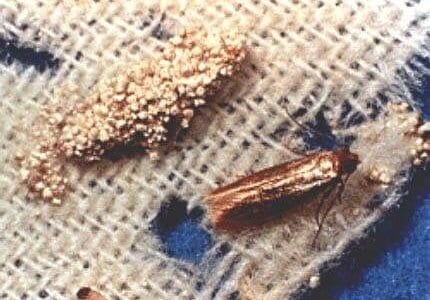
Textile pests will feed on wool (including cashmere and mohair), feathers, fur and silk.

Stored product pests are known to infest cereals, dried plant products, cocoa, corn meal, milk powder, dried soups, wheat, rice and seeds. They can be introduced with raw materials and thus lead to raw materials and lead to contaminated finished products.

Insects or part of their bodies found in goods (both food and non-food), can result in damage to a businesses reputation.

The presence of textile or stored product insects can incur huge financial implications.

Talk to Pest Solution’s friendly, knowledgeable staff:

After carrying out a survey our technician will:

Our fully qualified and insured technicians will:

After completion of the treatment, our technician will:
Textile pests are usually adapted to feed on a diet of wool, fur, silk and feathers. These consist primarily of keratin which is one of the most indigestible proteins. Special conditions in their gut enable them to break it down and thus render it digestible. There are many insects that infest textiles, and the more common ones are noted below. If you do not find the pest below, then please call for an identification and advice.

It is the larval stage (woolly bears) that cause damage to carpets and clothing.

Bird and rodent nests, animal remains and dead insects are frequently reservoirs of infestations, so museums are a favourite stop.

Adult moths do not feed, it is the larvae that feed on fabrics such as carpets and clothing.
Stored product pests are usually beetles or moths found in any stored commodities, the more common ones are noted below. If you do not find the pest below, then please call for an identification and advice.

The beetles attack milled grain products such as flour and cereals. These beetles often hitchhike into the house in infested flour and can build up into large populations on food accumulations in cabinet cracks and crevices and in furniture.

The caterpillars of this small moth causes considerable damage to stored food products. It commonly attacks chocolate, nuts and dried fruits as well as many other stored products.

The caterpillars of this small moth causes considerable damage to stored food products. It commonly attacks tobacco and cocoa, as well as grains, nuts, dried fruit and many other stored products.

Biscuit Beetles prefer a hard food into which they can bore holes such as pasta, biscuits, cereals and chocolate. They are also associated with birds nests.

Larvae prefer spoiled ham, bacon, dried beef and other meats. Larvae either bore into this meat or wander away to bore into wood, books and even metals such as lead and telephone cables to pupate.

Associated with bird’s nests and stored foodstuffs, it is also present in many industrial food storage situations. They occur in flour and feed mills, food warehousing and the domestic environment.